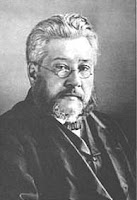 Vacation Bible School (VBS) is an annual tradition that descends upon evangelicalism in the summer time. Regardless of denomination or location, every church that I have been a part of has had some sort of VBS. It is ubiquitous.
Vacation Bible School (VBS) is an annual tradition that descends upon evangelicalism in the summer time. Regardless of denomination or location, every church that I have been a part of has had some sort of VBS. It is ubiquitous.In my experience, most VBS themes are too man-centered. The pre-packaged material often tells kids how great they are, that they can have a friend in Jesus, and that the gospel is a really good idea. There is often very little, if any, discussion of sin.
I'm suggesting that next year all churches use SIN as their VBS theme. It would be unpopular, but boy would it be biblical. It could be called something like, "You're a Rebel Who Deserves Hell." I'm not sure how that would go over, but it would certainly be fun.
For the typical 5-day VBS the daily core truths could go something like this:
Day 1 - God is infinitely holy and perfect.
Day 2 - You have sinned. You are a sinner.
Day 3 - Sin is infinite rebellion against holy God.
Day 4 - You deserve eternity in Hell.
Day 5 - Jesus Christ is Savior and Lord.
I could see some parents not being too keen on this theme. Also, some of the kids might be upset when they go home after Day 4 in particular. However, I bet they would be motivated to hear about salvation on Day 5. Of course, if they don't come back on Day 5 that would be a bummer.
I write this post a bit tongue-in-cheek. However, I'm serious as well. VBS is a microcosm of the modern church as a whole. In evangelicalism (to say nothing of mainline churches), we downplay sin. We don't like to talk about it, and if we do we speak in generalities. We enjoy discussing the love and grace of God, but shy away from His holy wrath.
We need to talk about sin much more than we do. When we do this, we are being biblical. Also, when we discuss our sin, it causes us to gaze with even more wonder upon the mercy of Christ.
So, for those of us involved in VBS, let's all agree to use SIN as the theme next year. Sure, our attendance will be way down, but at least we'll be biblical. Some kids might even actually get saved in the process.












